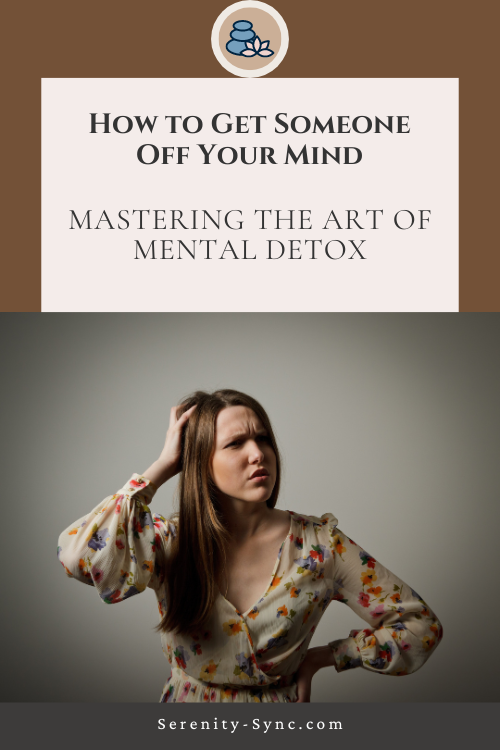In Brief
Struggling to remove someone from your thoughts can be mentally exhausting. This blog post, about How to Get Someone Off Your Mind, delves into various strategies and techniques to help you break free from constant rumination. From understanding the impact of negative thoughts on mental health to practical tips on how to shift your focus, this guide will empower you to regain control over your mind and emotions.
The Power of Thoughts in Shaping Our Mental Landscape
Our thoughts have a profound impact on our mental well-being, influencing our emotions and behaviors. Negative thought patterns can lead to increased stress and anxiety, affecting our overall mental health. It’s crucial to understand the link between our thoughts and emotions to address intrusive thoughts effectively. By learning techniques to reframe negative thinking, we can actively work towards creating a more positive mindset and enhancing our emotional resilience.
Our thoughts dictate our feelings and behaviors
Our thoughts serve as the foundation for our emotions and actions. When we consistently engage in negative thinking, it can significantly impact how we feel and behave in various situations. By recognizing the power of our thoughts, we can begin to take control of our mental landscape and steer it towards a more positive direction.
Negative thought patterns can lead to stress and anxiety
Continuous negative thought patterns have been linked to increased levels of stress and anxiety. These detrimental thinking habits can create a cycle of emotional distress, affecting our overall well-being. By acknowledging the impact of negative thoughts, we can actively work on challenging and changing them to promote mental wellness.
Techniques to reframe negative thinking
Practicing mindfulness and cognitive restructuring are effective techniques to reframe negative thinking patterns. By being mindful of our thoughts and intentionally shifting them towards more positive and constructive ones, we can gradually reshape our mental landscape and cultivate a healthier mindset.
Breaking the Cycle of Obsessive Thinking
Obsessive thinking can be overwhelming and consuming, especially when it revolves around a specific person. By recognizing the triggers of obsessive thoughts and implementing expert advice from professionals like Dr. Joanne Davila, individuals can learn to navigate through post-breakup ruminations and avoid distress triggers such as excessive social media exposure. Cultivating self-compassion and self-love are crucial steps in breaking free from obsessive thinking patterns and promoting emotional healing.
Tips for navigating post-breakup ruminations
Post-breakup periods are often characterized by intense rumination and emotional distress. Implementing coping mechanisms such as journaling, seeking support from friends, and engaging in self-care activities can help individuals navigate through this challenging phase with resilience and self-compassion.
Avoiding social media as a source of distress
Social media platforms can exacerbate feelings of distress and longing for someone. By limiting exposure to triggers like their social media profiles, individuals can create a healthier emotional space for themselves and focus on their personal growth and well-being.
Cultivating self-compassion and self-love
Self-compassion and self-love are essential components of breaking free from obsessive thinking patterns. By treating oneself with kindness and understanding, individuals can foster emotional healing and gradually shift their focus towards positive self-growth.
Strategies for Letting Go and Moving On
Letting go of someone involves a combination of emotional and practical steps. Cutting off virtual ties, removing nostalgic items, and implementing the “no contact” rule are crucial strategies for emotional healing. Engaging in physical activities and redirecting mental energy towards personal growth can aid in the process of moving on and fostering emotional liberation.
Importance of cutting off virtual ties with the person
Continuing virtual connections with the person can hinder the process of emotional healing and moving on. By cutting off these ties, individuals create space for closure and new beginnings, allowing themselves to focus on their personal well-being.
Implementing the “no contact” rule for emotional healing
The “no contact” rule involves refraining from communication with the person to facilitate emotional healing and create a sense of emotional liberation. This boundary-setting practice is essential for individuals seeking closure and personal growth after a significant emotional experience.
Redirecting mental energy towards personal growth
Engaging in activities that promote personal growth and self-discovery can help individuals shift their focus away from the past and towards the future. By investing time and energy in pursuits that bring fulfillment and joy, individuals can embark on a journey of healing and transformation.
Fun Fact
Did you know that listening to upbeat music can help distract the mind and reduce intrusive thoughts about someone? So, crank up your favorite tunes and let the music work its magic on your mental state!
Self-Care Practices for Mental Clarity
Embracing Mindfulness and Meditation for Peace of Mind
Mindfulness practices involve being present in the moment, acknowledging thoughts without judgment, and focusing on breathing to promote mental clarity and emotional resilience. Meditation, a form of mindfulness practice, helps calm the mind, reduce stress, and enhance self-awareness, contributing to overall well-being and inner peace.
Setting Healthy Boundaries to Protect Your Emotional Space
Establishing healthy boundaries involves recognizing your limits, communicating your needs assertively, and prioritizing self-respect. By setting boundaries, you protect your emotional well-being, nurture self-compassion, and create a supportive environment that fosters positive relationships and personal growth.
Prioritizing Self-Care Routines for Overall Well-Being
Self-care routines encompass activities that nourish your mind, body, and soul, such as exercise, healthy eating, adequate rest, and engaging in hobbies. By prioritizing self-care, you enhance your mental clarity, boost self-esteem, and cultivate a positive mindset essential for emotional healing and personal development.
Seeking Professional Help When Intrusive Thoughts Become Overwhelming
When intrusive thoughts or emotional distress persist, seeking professional guidance from therapists, counselors, or mental health professionals is crucial. Therapy provides a safe space to explore and address underlying issues, learn coping mechanisms, and develop strategies for managing emotions effectively, promoting emotional liberation and healing.
Cultivating a Support System for Emotional Resilience
Building a support system of friends, family, or support groups offers emotional validation, encouragement, and a sense of belonging during challenging times. Surrounding yourself with positive influences, practicing open communication, and seeking social support contribute to emotional resilience, self-acceptance, and overall well-being.
The Road to Emotional Liberation
Recognizing That Healing Is a Gradual Process
Healing from emotional distress requires patience, self-compassion, and acceptance that progress may unfold gradually. Acknowledging small steps towards healing, celebrating milestones, and embracing setbacks as part of the journey foster resilience, self-growth, and emotional liberation.
Embracing the Journey of Self-Discovery and Growth
Self-discovery involves exploring your values, beliefs, strengths, and weaknesses to gain self-awareness and promote personal growth. Embracing challenges, learning from experiences, and stepping out of your comfort zone facilitate emotional healing, self-acceptance, and transformation.
Finding Closure Through Acceptance and Forgiveness
In fact, Finding closure entails accepting the past, forgiving yourself and others, and letting go of resentment or grudges. Practicing forgiveness releases emotional burdens, promotes inner peace, and paves the way for new beginnings, fostering healing, and a positive mindset.
Celebrating Small Victories in Overcoming Obsessive Thoughts
Celebrating small victories, such as challenging negative thought patterns, practicing self-care, or seeking help when needed, reinforces progress and boosts self-esteem. By acknowledging achievements, cultivating self-compassion, and focusing on growth, you cultivate resilience, mental clarity, and emotional well-being.
Maintaining a Positive Outlook on the Future
Furthermore, Maintaining a positive outlook involves cultivating hope, optimism, and gratitude for the present moment and future possibilities. By envisioning a bright future, setting goals, and staying resilient in the face of challenges, you nurture emotional well-being, personal development, and a sense of emotional liberation.
Fun Fact
Did you know that writing down your thoughts in a journal can act as a therapeutic way to process emotions and gradually release them from your mind?
Conclusion
Embark on the journey to emotional liberation by embracing self-care practices, mindfulness, setting boundaries, seeking support, and celebrating victories. Remember, healing is a gradual process that requires self-compassion, acceptance, and a positive outlook. By prioritizing mental well-being, personal growth, and emotional resilience, you pave the way for a brighter, emotionally liberated future.

